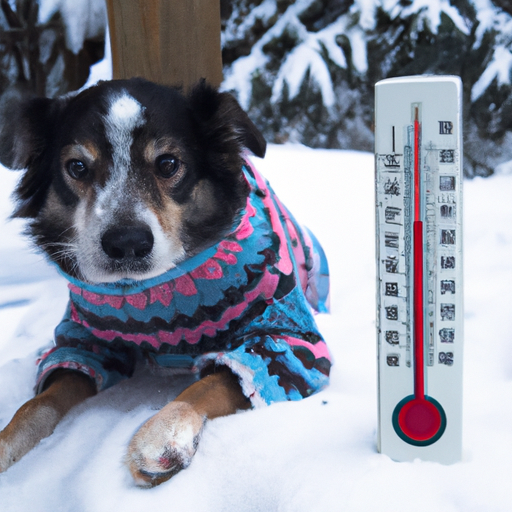As a caregiver, you constantly look after the well-being of your loved ones, including your furry family members. Your dogs, much as they love frolicking in the snow, are susceptible to cold weather conditions. In fact, cold weather can be as dangerous for dogs as it is for humans. But what exactly is too cold for them? This comprehensive guide will help you understand the threshold of cold for your canine companions.
H2 1: Understanding Dogs’ Tolerance to Cold
Dogs are like humans in many ways, but their tolerance to cold is not one of them. While some breeds are well adapted to cold weather, others are not.
- Cold-Weather Breeds: Northern breeds like Huskies, Malamutes, and Saint Bernards have thick coats that help them withstand colder temperatures.
- Short-haired Breeds: Dogs like Greyhounds and Chihuahuas have less natural insulation and are more susceptible to cold weather.
To determine if it’s too cold for your dog to be outside, consider their breed, age, health condition, and the actual weather conditions.
H2 2: Temperature Guidelines for Dogs
While there’s no exact temperature that’s universally too cold for dogs, there are general guidelines to follow.
| Temperature (°F) | Safety for Dogs |
|---|---|
| Above 45 | Safe for all dogs |
| 20 – 45 | Some dogs may feel discomfort |
| Below 20 | Potential risk for most dogs |
| Below 0 | Dangerous for all dogs |
Remember, these are general guidelines; always consider your dog’s breed, age, and health.
H2 3: Cold Weather Risks for Dogs
Cold weather brings a number of potential risks for dogs. Here are a few:
- Hypothermia: Dogs can suffer from hypothermia if they are exposed to cold for a long period. Symptoms include shivering, lethargy, and frostbite.
- Frostbite: Frostbite specifically targets extremities such as ears, paws, and tails. You might notice discoloration, coldness or brittleness in these areas.
- Ice and Snow: Snow can hide sharp objects or dangerous substances, while ice can cause injuries from slips and falls. Dogs might also ingest harmful road salts and antifreeze.
H2 4: Protecting Your Dog in Cold Weather
You can take several steps to ensure your dog stays safe and comfortable in cold weather.
- Provide appropriate shelter: If your dog spends a lot of time outside, ensure they have a warm, dry shelter to retreat to.
- Invest in dog clothing: Sweaters, booties, and jackets can provide extra warmth, especially for short-haired breeds.
- Limit outdoor time: Reduce the time your dog spends outside in very cold weather. Consider shorter, more frequent walks.
- Check paws regularly: Snow and ice can cause cuts or damage to your dog’s paws. Check them regularly and consider using dog-safe ice melts.
H2 5: Knowing When to See the Vet
If your dog shows signs of hypothermia or frostbite, or if they have ingested a harmful substance, take them to the vet immediately. Regular check-ups during winter can also help ensure your dog is in good health.
FAQ Section
Q1: Are certain breeds more susceptible to cold weather?
Yes, short-haired breeds and small dogs are generally more susceptible to cold weather than large or long-haired breeds.
Q2: How can I tell if my dog is too cold?
Signs include shivering, anxiety, slowing down, searching for warm locations, and whining.
Q3: Can dogs get frostbite?
Yes, dogs can get frostbite, typically on their extremities like ears, tail, and paws.
Q4: How can I protect my dog’s paws in winter?
Regular checks, cleaning, and use of dog booties can help protect your dog’s paws from cold, ice, and de-icing chemicals.
Q5: What should I do if I suspect hypothermia in my dog?
If you suspect your dog has hypothermia, immediately bring them inside to a warm environment and wrap them in warm blankets. Contact your vet as soon as possible.
Taking care of a dog in cold weather can be challenging, but remember, as a caregiver, your primary goal is to ensure the safety and comfort of your loved ones. Stay alert to changes in your dog’s behavior and health, and you should have no trouble enjoying the winter months together.



